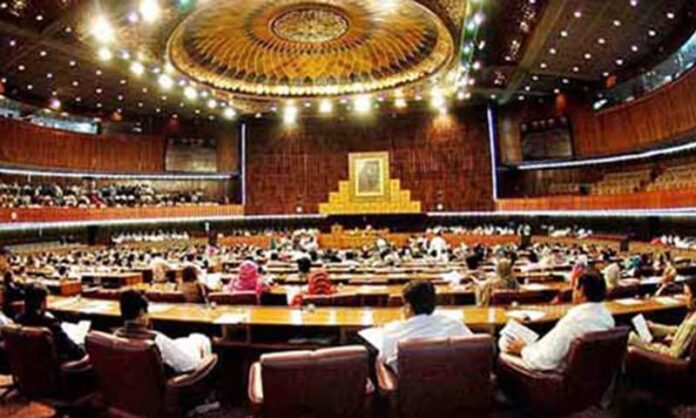The National Assembly passed the Finance Bill 2020 on Monday after rejecting all the joint opposition amendments which resulted in increased hostility between both sides in the House.
In the National Assembly session, which was also attended by Prime Minister Imran Khan, Federal Minister of Industry and Production Hammad Azhar launched a debate on the Finance Bill 2020 before giving a clause-by-clause reading to the bill seeking nod from the House to get the bill sailed through. Surprisingly, when the PM arrived, the House had a smooth sail to the pleasant surprise of the treasury benches who expected the opposition to receive a hostile welcome. Around the time the Premier arrived at the Chamber, the opposition remained quiet.
Shazia Marri of the People’s Party of Pakistan (PPP), who was speaking on the Finance Bill 2020, continued her speech as the PM entered the Chamber. At the voting point, there were as many as 160 votes cast in support of the bill while 119 against the bill went.
Speaker of the National Assembly Asad Qaiser started holding a vote on Clause 9 of the bill during clause-by-provision reading after the joint opposition objected to this provision of Finance Bill 2020.
Hammad Azhar requested the presiding officer’s permission to transfer all of the Finance Bill 2020 clauses which would come into force from the first day of July 2020.
Whether or not any of the amendments suggested by the Senate to the National Assembly on Finance Bill 2020 were incorporated remained uncertain as Azhar did not disclose anything relevant to the proposals made by the Senate during the House session.
Senate consistently adopted a total of 93 Senate Standing Committee on Finance recommendations relevant to the Finance Bill 2020 and forwarded them to the National Assembly for consideration.
Parliament’s upper house may conduct comprehensive debate on a money bill, including a finance bill, and draft recommendations accordingly, but it has virtually no position in budget legislation concerning a money bill, as it is entirely up to the National Assembly to either approve such recommendations in full or in part or give them an outright rejection.
In fact, a money bill doesn’t land in the Senate or seek passage nod from the upper house to become a statute. This only needs to be approved by the NA with a simple majority, and then includes the President of Pakistan’s ceremonial elevation to become a rule.
Previously, in response to opposition members’ criticism of increasing petroleum prices and levy, industry and production ministers said the previous federal government had set the maximum cap of Rs 30 per liter for petroleum levy. The previous government, he added, also increased petrol prices by 35 per cent in a month.
Opposition party leaders came to the government hard on rising petroleum prices and portrayed it as unfair and unjustified taxation of the poor to support the petroleum cartel by enabling oil companies to make windfall profits.
Speaking at the occasion, Khawaja Muhammad Asif said that, in the first place, the government and petroleum sellers created an artificial shortage of petroleum prices to justify the petroleum price increases.
“Petroleum levy is directly related to the budget and spillover impact of this unprecedented increase has jolted every segment of the society across the country. From increase in gas and electricity prices to those of essential commodities, the present government is leaving no stone unturned to add to the miseries of already suffering masses. This budget is an interim arrangement strongly resented by public circles,” he remarked.
Chairman of the Pakistan People’s Party (PPP) Bilawal Bhutto Zardari said that he “cannot decide from where to proceed,” as, he added, Hammad Azhar claimed in his budget speech that oil prices would be reduced to Rs 45 per liter, and that Rs 70 billion would be earmarked for this reason under the economic stimulus package. “But things turned differently, instead of reducing the price of petroleum to Rs 45 per liter the federal government ended up increasing the same by Rs 25.”
He further said the government is attacking Pakistan International Airlines (PIA) pilots with the intention of privatizing the national airline. “The government has taxed the poor Pakistanis in the form of petroleum levy rises and the people have failed this budget,” he added.



